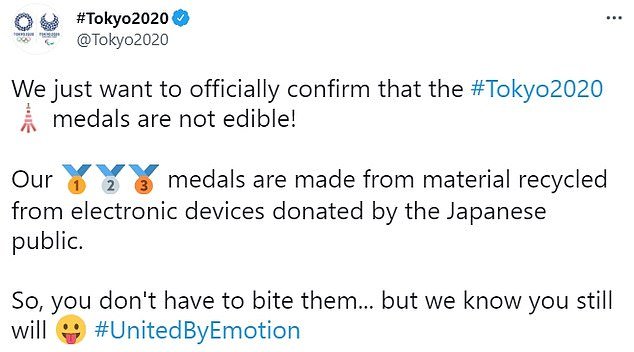Tokyo Olympic Committee warns against biting gold medals

This scene has now become a familiar scene in the Olympic campaign: an athlete who sees his country's flag waving and excited by hearing his country's national anthem, can not stop himself and bite the gold medal hanging around his neck.
The case has provoked a lot of reactions on social media, prompting organizers to make a sarcastic warning to athletes that the trophies of victory are not edible!

The official Twitter account of the 2020 Tokyo Olympics tweeted on Sunday: "We just want to make it official that the medals of the Tokyo 2020 Olympics are not edible. Our medals are made from recycled electronic devices donated by Japanese citizens. "So you do not have to bite them, although we know you will continue to do so."

Among the athletes who dipped their teeth into their medals were: Anastasia Zolotich, who won the gold medal in the women's 57kg Taekwondo; Ryan Murphy, who won the men's 100m breaststroke, and Tom Daley, a British diver.
Seeing this scene raises the question of what makes athletes want to bite their medals? The answer to this question has two parts. Traditionally, anyone in the past wanted to measure the purity of gold by biting it because gold is a relatively soft metal that leaves teeth mark on it.
Of course, since the Tokyo Olympic medal contains only a little over 1% gold, and the rest is silver and copper, biting does not leave a special mark on the medal. In today's Olympic climate, the goal seems to be to create that famous scene for the cameras.

"It's become an obsession with the photographers," says Olympic historian David Wallechinsky. "I think they look at it as an iconic shot, as something that you can probably sell. I don't think it's something the athletes would probably do on their own."
The fever of medal bites intensified at the 2016 Rio Olympics, and despite the efforts of the International Olympic Committee, there is no sign of the fever subsiding at the Tokyo Olympics. About 5,000 gold, silver and bronze medals distributed at the competition are made from metals extracted from small electronics, and organizers hope the work they have begun will continue in the future.